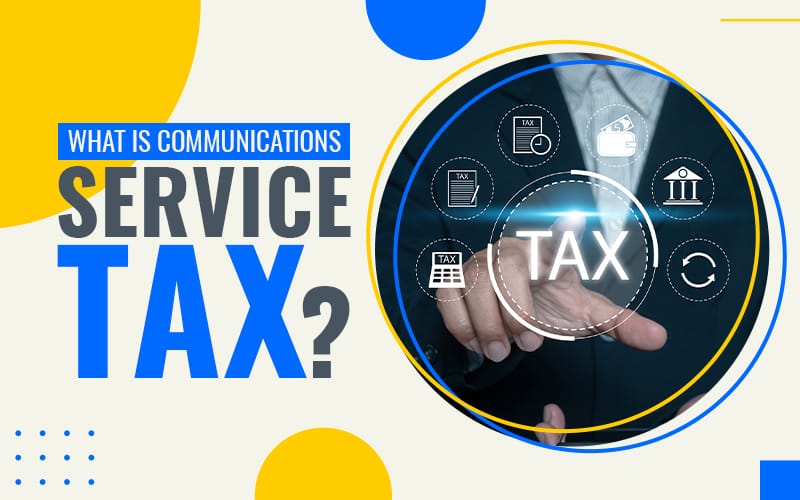
The Communications Service Tax (CST) is a tax imposed on various communications services, including telephone, mobile, internet, and satellite. Introduced to generate revenue for governments, CST ensures that companies providing these services contribute a fair share to public finances. As technology and communication services have evolved, CST has adapted to cover a broad range of services and transactions that many businesses and individuals rely on daily. Understanding this tax is critical for businesses and consumers alike, as it affects pricing, billing, and compliance obligations.
The Basics of Communication Service Tax (CST)
CST is typically charged at the state or local level, with rates and rules varying from one jurisdiction to another. The tax is levied on the sale or use of communications services such as:
- Telephone services: This includes landline and mobile services.
- Internet services: Both residential and commercial internet services.
- Satellite and cable TV services: Subscription and usage-based television services are also covered.
- VoIP (Voice over Internet Protocol): Internet-based phone services fall under CST regulations as well.
- Wireless data services: Internet and data services provided by mobile carriers.
Depending on the state, these taxes may be charged directly to the consumer or the service provider, who in turn passes the cost on to customers.
A Brief History of Communication Service Tax
The idea of taxing communications services has been introduced previously. As early as the 1930s, telephone services were subject to federal excise taxes. Over the years, as technology evolved, the tax base expanded to include mobile phones, internet services, and digital communications. The modern Communications Service Tax became a crucial revenue source for states and local governments to fund essential services like education, infrastructure, and public safety.
The original intent of CST was to address a rapidly changing technological landscape and ensure fair contributions from businesses in the telecommunications industry. As more Americans adopted mobile phones, broadband internet, and cable services, CST played a role in capturing this market activity for tax purposes.
How CST is Applied
The Communications Service Tax can be applied differently depending on the state. Some states impose a flat rate across all communications services, while others may have tiered rates depending on the type of service being taxed. For example, mobile phone services may be taxed at a higher rate than residential internet or cable services.
Additionally, the way CST is calculated can vary:
- Usage-based taxes: In some states, CST is based on the actual usage of the communication service (e.g., the number of minutes on a mobile phone or the amount of data used).
- Subscription-based taxes: Other states levy CST as a percentage of the monthly subscription fee for services like cable television or internet access.
Exemptions and Special Cases
While most communications services are subject to CST, there are exceptions. Some services may be exempt from the tax, or different tax rates may apply depending on the user or the service’s purpose. For example:
- Governmental agencies: Services provided to state or federal agencies may be exempt from CST.
Non-profit organizations: Certain non-profit organizations may be eligible for reduced rates or exemptions depending on state law. - Resale exemption: Businesses that resell communication services may qualify for an exemption or a lower tax rate, depending on the specific conditions set by state law.
Understanding these exemptions is critical for businesses to ensure they are not overpaying or incorrectly applying the tax to services that may qualify for exemptions.
Choose the Right CPA Firm for Your Business
Partner with Jarrar & Associates for expert tax, accounting, and financial guidance tailored to your needs—so you can focus on growth.
Why CST Matters for Businesses
For businesses that rely heavily on communication services, CST can represent a significant cost. Many companies may be unaware of their compliance obligations or how much they are paying in CST, particularly if they operate across multiple states with different tax rates and rules.
Here are some key reasons why CST matters for businesses:
- Cost Management: CST can add up quickly, especially for businesses that use multiple communication services. Understanding the tax and how it is applied can help businesses manage costs more effectively.
- Compliance: Businesses must stay compliant with CST regulations in each state where they operate. Failure to comply can result in penalties, fines, and legal issues.
- Customer Pricing: Many businesses pass CST on to their customers as part of their pricing. Understanding the tax allows businesses to price their services accurately and ensure they are collecting the right amount from customers.
- Exemptions: Businesses may qualify for certain exemptions or reduced rates on CST, particularly if they resell communications services. Identifying and applying for these exemptions can result in significant savings.
How CST Impacts Consumers
For consumers, CST may appear as an extra charge on their monthly bills for phone, internet, or TV services. While the tax itself is levied on the service provider, it is often passed on to consumers in the form of higher costs.
Consumers should be aware of the tax as it can vary significantly depending on where they live. In some states, CST rates are relatively low, while in others, they can represent a sizable portion of the total bill. Understanding the tax can help consumers make informed decisions about their communication service providers and potentially save money by choosing services in areas with lower tax rates.
Key Considerations for Tax Planning
For businesses, CST represents a tax that must be factored into long-term financial planning. Many companies overlook CST as part of their overall tax strategy, which can lead to unexpected costs. Working with a tax professional can help businesses navigate the complexities of CST, particularly if they operate in multiple states with varying rules and rates.
Businesses should also regularly review their communication services to ensure they are not overpaying CST or missing out on potential exemptions. Keeping accurate records and ensuring proper compliance can save time and money in the long run.
Conclusion
The Communications Service Tax is an essential aspect of tax policy that affects businesses, consumers, and governments alike. Understanding how CST works, who is subject to the tax, and how it is applied can help both businesses and consumers manage their costs and stay compliant with the law. By staying informed about CST, companies can better plan for their financial future, avoid compliance issues, and ensure they are not overpaying for communication services.



